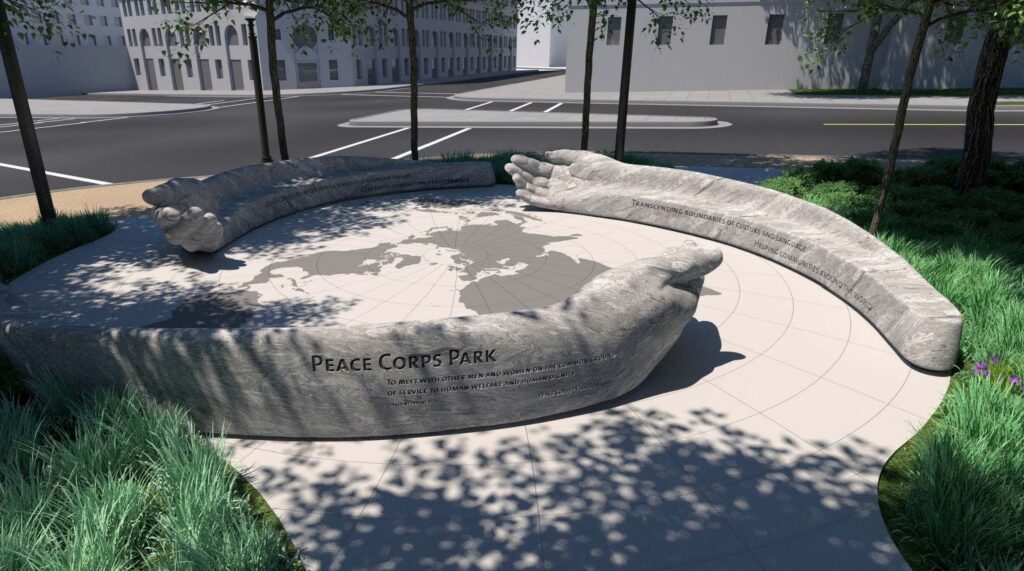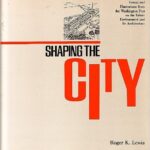RPCV Professor Roger K. Lewis, FAIA (Tunisia)
President and Director at Peace Corps Commemorative Foundation
Roger K. Lewis, FAIA (Tunisia 1964-66)
President and Chairman, PCCF
Architect, Professor Emeritus of Architecture, University of Maryland
RLewis@PeaceCorpsCommemorative.org
Scores of memorials in Washington, DC, honor America’s historic events, patriotic leaders and the millions of individuals who have served and sacrificed at home and overseas in defense of our country and freedom. Yet absent in the heart of the nation’s capital is a commemorative work about a different manifestation of America’s history, about this country’s enduring ideals and values symbolized by Peace Corps service.
Who is Roger K. Lewis (Tunisia 1964-66)
 Professor Roger K. Lewis, FAIA helped start and subsequently nurture the University of Maryland’s School of Architecture, established by the University in 1967. During the School’s early years, in addition to teaching design, he initiated and taught two seminal courses: Introduction to the Built Environment (ARCH 170), a wide-ranging survey of architecture and urban design fundamentals for freshmen and sophomores; and “Economic Determinants in Architecture,” an elective for advanced architectural students focused on the real estate development process.
Professor Roger K. Lewis, FAIA helped start and subsequently nurture the University of Maryland’s School of Architecture, established by the University in 1967. During the School’s early years, in addition to teaching design, he initiated and taught two seminal courses: Introduction to the Built Environment (ARCH 170), a wide-ranging survey of architecture and urban design fundamentals for freshmen and sophomores; and “Economic Determinants in Architecture,” an elective for advanced architectural students focused on the real estate development process.
During the summer of 1971, accompanying the late Charles Moore, distinguished visiting Kea Professor, and Dean John Hill, he led 17 students–the School’s first graduating class–on a five-week study tour of Western Europe, Turkey and Tunisia, the School’s first summer study abroad program. In 1996, in collaboration with Professor Marie Howland, Director of the Urban Studies program, and Professor Matthew Bell, Professor Lewis directed a group of American architecture and urban planning students, along with Russian architecture students, engaged in the School’s first-ever program in St. Petersburg, Russia.
Professor Lewis has always combined teaching and practice, believing that one informs and energizes the other. His experience as a practitioner began in the Peace Corps in Tunisia, where he was an architect for the Ministry of Public Works and was responsible for designing more than 30 government-financed projects, over half of which were built. These included municipal auditoriums, shopping facilities, schools, a boy scout camp, a movie theater, a hotel, a historic mosque renovation, and public gardens.
Immediately after he began teaching, he established his architecture and planning firm based in Washington, DC. Since 1969, he has designed award-winning private residences, low-income and elderly housing as well as market-rate housing, community buildings, public and private recreational facilities, art centers, commercial structures and schools. His firm has prepared master plans and design guidelines for new communities or for the expansion of existing communities, both in the eastern United States and abroad.
In 1984, Professor Lewis made a proposal to The Washington Post to write and illustrate a series of essays about the history of Washington, DC, and its architecture. The 1984 essay series proved very successful, and since then, he has been a regular Washington Post columnist writing thematic articles and drawing accompanying cartoons. His columns cover architectural design, planning, land use regulation, “smart growth,” housing, transportation and infrastructure, historic preservation, landscape architecture, sustainability and public policy affecting the built environment. In 1987, the AIA Press compiled a number of Shaping the City articles and cartoons and published a book of the same name.
The MIT Press published his first book, Architect? A Candid Guide to the Profession, in 1985, which became an MIT Press best-seller. A revised edition was published in 1998. Used as an introductory text for would-be architects at universities throughout North America, the book has been translated into Japanese, Korean and Spanish.


No comments yet.
Add your comment